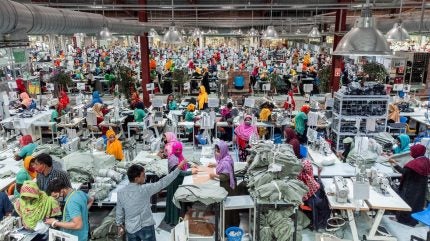
The research, titled ‘Modern slavery and child labour in Bangladesh’s garment sector: Documenting risks and informing solutions,’ pays particular attention to covert and unregistered subcontracting locations and aims to reveal the extent of domestic production activities in the industry.
The study hoped to fill the knowledge void concerning forced labour and child labour by directly engaging with employees to understand their experiences in both industrial and domestic settings.
The goal was to gather insights that could guide efforts by corporations, government entities, and non-profit organisations to enhance human rights within Bangladesh’s garment industry.
The research paid attention to the unique situations faced by female workers, young individuals, and those under financial strain.
It detailed the current conditions in Dhaka and Chattogram’s garment sector. The analysis took into account the post-pandemic scenario, recent enactments of minimum wage legislation, and reflected on it being a decade since the Rana Plaza disaster.
It also evaluated the collective measures taken thereafter to mitigate future incidents from an occupational health and safety standpoint.
According to the report, Bangladesh’s RMG sector generated $46.991bn in the 2022-2023 financial year, representing 85% of the country’s total export earnings of $55.558bn.
The US emerged as the largest importer of Bangladesh garments, purchasing goods worth $9.701bn. Germany and the UK followed, with imports valued at $7.079bn and $5.310bn, respectively.
Key findings from the study
Child labour: The report claims child labour is present in the garment export supply chain, particularly in subcontracted factories. All minors interviewed for the study were illegally employed as child labourers in garment factories.
Low wages: Almost a third (32%) of adult garment workers surveyed were paid below the minimum wage, with 7% earning an income that fell below the international poverty line.
Excessive work hours: Nearly one-third of factory workers reported working more than 10 hours per day, six days a week, which is beyond the legal limit for regular and overtime hours. This is a key indicator of forced labour.
Gender pay gap: Despite a higher number of women working in the garment sector, they earned on average Tk2,000 ($18) less per month than their male counterparts.
Abuse and Threats: 56% of factory workers surveyed reported experiencing threats or abuse at work. Notably, 68% of adult workers and 90% of minors who experienced abuse were female.
The report offered a series of actionable recommendations for the Bangladesh government, international buyers, local garment suppliers, NGOs, and trade unions.
These recommendations included improving supply chain transparency, conducting risk-based human rights due diligence, ensuring fair compensation for workers, mitigating child and forced labour, and establishing effective grievance mechanisms.
GoodWeave International CEO Jon Jacoby said: “This report highlights the persistent risks of exploitation in the hidden tiers of Bangladesh’s garment supply chain, while offering systemic, scalable solutions. By joining forces for more effective due diligence, brands, suppliers, governments, trade unions, and civil society can safeguard the rights and dignity of vulnerable workers and children while supporting the sustainable growth of this crucial industry for Bangladesh. Let’s roll up our sleeves and take the high road—together.”
The Rights Lab director Zoe Trodd added: “Our extensive research on modern slavery in supply chains shows that manufacturing is one of the highest-risk industries for forced labour. We are pleased to partner with GoodWeave and the Bangladesh Labor Foundation to better understand the scope of exploitation in garment production and identify key areas where change is essential to ensure decent work conditions.”
Following the report’s launch, the Rights Lab and GoodWeave is set to host a series of events to share their findings and drive action.
The first event was a virtual session held on 10 February, during the OECD Forum on Due Diligence in the Garment and Footwear Sector, an annual global conference focusing on responsible business conduct in the garment industry.
The research was conducted through surveys and focus group discussions with over 2,000 adult and minor workers across 20 industrial clusters in Dhaka and Chattogram, the two main garment production hubs in the country.
It was funded by the UK government’s International Development programme.
The Bangladesh Garment Manufacturers and Exporters Association (BGMEA) had not responded to Just Style’s request for comment at the time of going to press.
Last month, the American Apparel & Footwear Association and the Fair Labor Association urged the Bangladesh government and industry leaders to prioritise enhancing garment workers’ rights to ensure the country’s long-term success.



